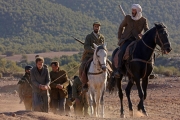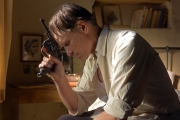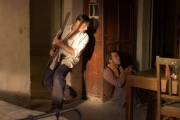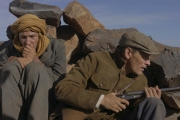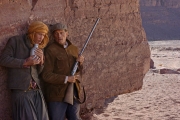![]() Presentation by and discussion with director and screenwriter David Oelhoffen
Presentation by and discussion with director and screenwriter David Oelhoffen
1954. While civil unrest flairs in the valley behind them, two men are forced to flee across the Algerian Atlas Mountains. In the middle of a glacial winter, Daru, a reclusive teacher must escort Mohamed, a farmer accused of killing his own cousin, to the city to be put on trial. Pursued by villagers seeking blood revenge and vindictive French settlers, the two men will, together, struggle to reclaim their freedom.
Cast & Crew
Director • David Oelhoffen
Screenwriter • David Oelhoffen, based on “L’Hôte” from the collection L’Exil et le Royaume by Albert Camus
Director of Photography • Guillaume Deffontaines
Producers • Marc du Pontavice and Matthew Gledhil
Starring :
Viggo Mortensen, Reda Kateb…
Choose a picture to see the filmography (source : IMDB)
![]()
Why did you choose to adapt Albert Camus’ short story L’Hôte ?
[This text] appeared to me as very contemporary and befitting the problems of today’s world – one that is on the verge of breaking down in many places. I could also see the premises of a western with the presence of nature, the escorted prisoner, and the confronting systems of laws, either tribal or Western. Of course the myth behind Loin des hommes is not that of the conquest of the American wild West, but that of the conquest of the world through the spread of the ideas inherited from the philosophers of the Enlightenment, a myth of French universalism, that brings in culture and freedom . . . but eventually turns those humanist values against local populations, importing an unfair system.
How did you avoid depicting a philosophical reflection – an inherent risk when adapting Camus?
I find his work admirable but would not have taken the risk of adapting one of his novels […] My first concern was to develop the story, heighten it and mostly personify it. The first questions I had concerned the moral conflict brought up in this short story and its very representation: how to turn this internal moral conflict into an external conflict, or into violence in our case, using cinematic tools and how to address this violence? Allowing yourself a certain freedom from the text, trying to find your path in this new territory, is also a way to be faithful to Camus. [ . . . ] Cinematic questionings often consisted in departing from the letter and getting closer to the spirit of Camus’ writing.
Nature holds a predominant place in the movie . . .
It is the third main character. The film is aesthetically pleasing but this beauty is not strictly formal, I hope it conveys meaning. The landscape, the dryness of the sites, the stones, the immense skies, everything contributes to the absurdity of the situation. Nature is omnipresent and imposing. It humbles us, crushes us, impresses us, and influences the characters, the same way that it influenced us during the shooting.
Press Kit “Loin des hommes”
English ~ 8 pages ~ 1,2 Mo ~ pdf
Press Kit “Loin des hommes”
French ~ 10 pages ~ 3,5 Mo ~ pdf



